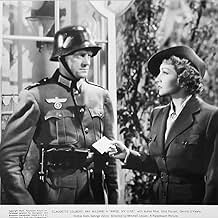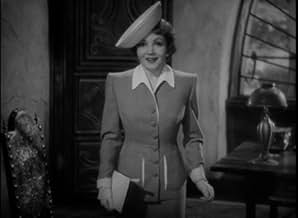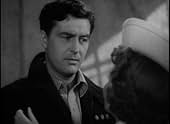NOTE IMDb
6,8/10
1,1 k
MA NOTE
Ajouter une intrigue dans votre langueA dashing pilot and a vivacious reporter have romantic and dramatic adventures in Europe as World War II begins.A dashing pilot and a vivacious reporter have romantic and dramatic adventures in Europe as World War II begins.A dashing pilot and a vivacious reporter have romantic and dramatic adventures in Europe as World War II begins.
- Réalisation
- Scénario
- Casting principal
- Récompensé par 1 Oscar
- 4 victoires et 3 nominations au total
Rafael Alcayde
- French Correspondent
- (non crédité)
Rudolph Anders
- Prussian Officer
- (non crédité)
Carmen Bailey
- Woman at Maxim's
- (non crédité)
Charles Bastin
- Elevator Boy
- (non crédité)
Avis à la une
In the final analysis, a film is about cinematography. From the very beginning at the Spanish prison, extraordinary cinematography is used to an exceptional degree, and it continues through the film. There are minor exceptions, as with the file film of airplanes flying. More importantly, the film claims the obvious: The Spanish government in 1939 had more than casual leanings toward Berlin. The bombing of Guernica by the Nazi air force is testimony, here reinforced. Tom Martin (Ray Millard) says he had a pet rat in his jail cell named "Adolph." Spain's neutrality during World War Two is in question with Paramount Pictures, as it was in diplomatic circles. Of course, a 1940 movie about event of 1939 has the advantage of historical retrospect, yet the public actions of the Spanish government stand. Claudette Colbert as Agusta Nash is the career woman whose career comes before love, who puts her career before all. Her assignment as Special Berlin Correspondent is to tell of Hitler and his gang. A series of unpredictable events leads her to redefine her sense of patriotism. There are, in effect, many loves which must arise and spite the envious moon. Cinematography, historical theme, and some darn good acting all unite for an effective historical perspective on life at the beginnings of World War Two.
This is a good movie, full of snappy lines, very capable acting and interesting scenes. Mitchell Leisen has an above average script to work with, and when this happens you can be assured of a very watchable movie. Well worth a DVD release (can you hear me Universal!), but this inexplicably has never even made it on to VHS.
It features a strong capable woman (a trademark Leisen feature), but her male counterpart is no weakling is either, Ray Milland matches Claudette Colbert all of the way, helping create dramatic interest. The last section of the movie after the sinking of the Athenia is a bit underwritten and slightly unconvincing, but this is only a minor quibble.
Very well worth watching.
It features a strong capable woman (a trademark Leisen feature), but her male counterpart is no weakling is either, Ray Milland matches Claudette Colbert all of the way, helping create dramatic interest. The last section of the movie after the sinking of the Athenia is a bit underwritten and slightly unconvincing, but this is only a minor quibble.
Very well worth watching.
Mitchell Leisen was one of the few directors who could introduce tragedy into comedy and vice versa .The first part is absolutely dazzling.Incredible though it may seem ,it's full of unexpected twists,of fine lines ("it's my first execution" says the Padre /It's mine too" says the prisoner).The chemistry between Claudette Colbert and Ray Milland is perfect and their husband-and-wife act compares favorably with that of the actress as a "baroness ,her husband and her children" in "midnight" .The movie loses steam in its second part but it does show Mitchell's fondness for France .Unlike too many American movies,there are plenty of French words and the French speak French between them.I particularly like this sentence "Three sisters used to live in this country :Liberté ,Egalité Et Fraternité " as the German army is marching past the streets of Paris.This francophilia is also present in Leisen's "hold back the dawn" or "Frenchman's creek" .
The last third may be considered a propaganda one ,but many other directors (Hitchcock,Lang,Hathaway,Borzage etc) had theirs too,and Leisen's is certainly smarter than most of the others.Solomon's prayer (which provides the title) is to be taken literally.Augusta is a go-getter ,she plays the heroine just for the sake of fame .After the beautiful scene in the forest ,where the animals run for their lives ,she does arise .The scene in the Compiègne Car is as incredible as Marlene Dietrich as a gypsy entering an inn full of Nazis in "golden earrings" .But the Spanish extravagant tale had warned us:this is not to be taken seriously ,but in a way,it is.
The last third may be considered a propaganda one ,but many other directors (Hitchcock,Lang,Hathaway,Borzage etc) had theirs too,and Leisen's is certainly smarter than most of the others.Solomon's prayer (which provides the title) is to be taken literally.Augusta is a go-getter ,she plays the heroine just for the sake of fame .After the beautiful scene in the forest ,where the animals run for their lives ,she does arise .The scene in the Compiègne Car is as incredible as Marlene Dietrich as a gypsy entering an inn full of Nazis in "golden earrings" .But the Spanish extravagant tale had warned us:this is not to be taken seriously ,but in a way,it is.
Mitchell Leisen gets superb performances from CLAUDETTE COLBERT and RAY MILLAND in ARISE, MY LOVE.
It's a comedy/drama with Claudette as a journalist tired of covering fluffy stories who decides to get into serious journalism by rescuing a man about to be executed during the Spanish Civil War (Milland) so that she can be the first writer to get a scoop on a great story. As soon as she and her prisoner meet, the deft comic timing of these two pros are given great support from Billy Wilder's clever script. Early on, there's a scene of mistaken intentions that has Ray thinking Claudette wants to seduce him. He's oblivious to the fact that she merely wants to take some photos of him for the article she intends to write. The double entendre dialog has seldom been matched, in this scene alone.
Personally, I prefer "Midnight," another Leisen/Colbert film shown before this one on TCM. It's even wittier and much funnier. The trouble with ARISE, MY LOVE is that it attempts to do too many things at once and emerges as an uneven romantic comedy with a war background. For the ending, Claudette gets to deliver a flag waving speech that is obviously meant for 1940 audiences who were facing the prospect of getting involved in WWII.
Lots of laughs along the way with both stars delivering excellent performances.
It's a comedy/drama with Claudette as a journalist tired of covering fluffy stories who decides to get into serious journalism by rescuing a man about to be executed during the Spanish Civil War (Milland) so that she can be the first writer to get a scoop on a great story. As soon as she and her prisoner meet, the deft comic timing of these two pros are given great support from Billy Wilder's clever script. Early on, there's a scene of mistaken intentions that has Ray thinking Claudette wants to seduce him. He's oblivious to the fact that she merely wants to take some photos of him for the article she intends to write. The double entendre dialog has seldom been matched, in this scene alone.
Personally, I prefer "Midnight," another Leisen/Colbert film shown before this one on TCM. It's even wittier and much funnier. The trouble with ARISE, MY LOVE is that it attempts to do too many things at once and emerges as an uneven romantic comedy with a war background. For the ending, Claudette gets to deliver a flag waving speech that is obviously meant for 1940 audiences who were facing the prospect of getting involved in WWII.
Lots of laughs along the way with both stars delivering excellent performances.
10clanciai
Both Claudette Colbert and Ray Milland are superb in this brilliant war comedy drama in the shadow of the Spanish civil war and the Second World War. It was Claudette Colbert's own favourite among her films, and you'll understand some of its qualities better when you study the list of the script writers, one of whom was the young Billy Wilder. The dialog is brilliant all the way, there is any amount of eloquent scenes, and the romance gradually grows quite naturally with some skirmishes along the way. Walter Abel also gives one of his best performances as Claudette Colbert's employer, as he also gets his nose too far out into the business. Claudette Colbert is a journalist who goes to Spain to get out an American prisoner, who awaits his execution. That is Ray Milland, and the very first scene is perhaps the very best one, as Ray Milland sits in his cell waiting for his execution playing cards with a priest, while the firing squad is busy just outside, leaving one body just outside Ray Milland's window in a shadow that won't go away. Add to this the romantic music of Victor Young, which adorns many of the long romance scenes, while gradually the comedy transcends into a major war drama, with some curious coincidences on the way: on the train to Berlin, both Ray and Claudette being together on it, the emergency break is pulled just as the war breaks out, and when Ray and Claudette decide to leave all career thinking behind and go back to America to embark on a normal life, their ship gets torpedoed, and the war starts for real.
It's a delightful and innovative comedy all the way, eloquently mixed with some very serious business, and the film is so positive and edifying, that it would be worth returning to it every once in a while - it's the perfect emergency readiness film.
It's a delightful and innovative comedy all the way, eloquently mixed with some very serious business, and the film is so positive and edifying, that it would be worth returning to it every once in a while - it's the perfect emergency readiness film.
Le saviez-vous
- AnecdotesClaudette Colbert once said that this was the favorite of all of her films.
- GaffesWhen Walter Abel tells Claudette Colbert that she has got a new assignment in Berlin and she is told she is going in 3 days time on Saturday, she receives a cable dated September 1st, 1939, from Ray Milland. September 1st, 1939, was a Friday.
- Citations
Mr. Phillips: Gusto Nash, you're fired, as of immediately!
Augusta Nash: Oh, it's not true!
Mr. Phillips: I know it's not true. I just wanted to taste the words. Sheer rapture!
- ConnexionsFeatured in Hollywood contra Franco (2008)
- Bandes originalesDream Lover
(1929) (uncredited)
Written by Victor Schertzinger
Lyrics by Clifford Grey
Sung and hummed by Claudette Colbert
Introduced in Parade d'amour (1929)
Meilleurs choix
Connectez-vous pour évaluer et suivre la liste de favoris afin de recevoir des recommandations personnalisées
- How long is Arise, My Love?Alimenté par Alexa
Détails
- Date de sortie
- Pays d’origine
- Langues
- Aussi connu sous le nom de
- Vår flygande reporter
- Lieux de tournage
- Société de production
- Voir plus de crédits d'entreprise sur IMDbPro
- Durée
- 1h 50min(110 min)
- Couleur
- Rapport de forme
- 1.37 : 1
Contribuer à cette page
Suggérer une modification ou ajouter du contenu manquant






















